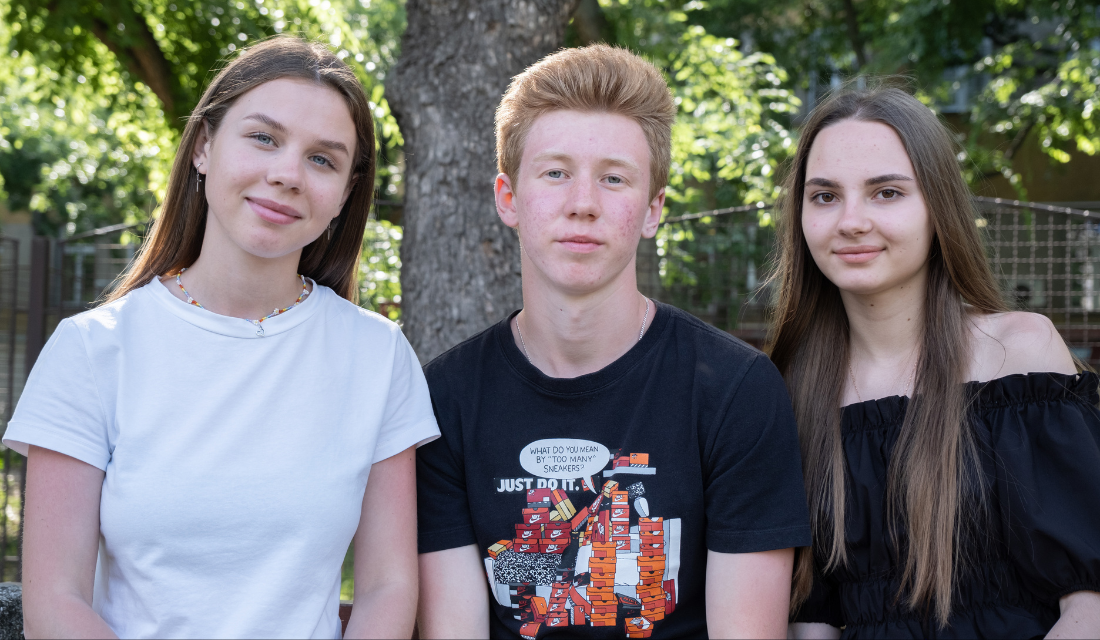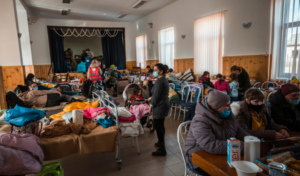Finding Support After Fleeing Ukraine

“In February, I was living a normal life,” Dmitry recalled. “I was studying logistics and marketing and playing football [soccer]. I wanted to be a professional footballer and had a contract with the Mariupol junior football team.”
By the end of February, the battles started in the suburbs of Mariupol in Ukraine and quickly brought fear and destruction to the city center where Dmitry, Anna and Kristina, three teenage university students, lived. Suddenly, their professional goals were on hold as their home became an active combat zone.
“Russian tanks were shelling the buildings,” Kristina recalled. “We made shelters in the interior hallways between apartments, near the elevator, as that was the safest place.”
“The week after the war started, a rocket landed in our yard, wounding a woman. We went to shelter in a school, but after an unexploded bomb was found near the school, we went back to the flat. We were so scared we could not sleep.”
The three endured the terrors for a month living in fear as buildings crumbled around them. What was once familiar became hazardous.
“The week after the war started, a rocket landed in our yard, wounding a woman,” Kristina shared. “We went to shelter in a school, but after an unexploded bomb was found near the school, we went back to the flat. We were so scared we could not sleep.”
As soldiers filled the streets and parked their tanks, they also began to loot apartments. Then, the city lost power and cell service became spotty. It was almost impossible to keep in touch with their families or get accurate information.
“We had no electricity, no information, no internet,” Dmitry said. “The only information we could get was from Russian soldiers, who told us Kyiv, Mariupol and Odessa were all under Russian control.”
“There was one building, higher than the others, that you could climb to the top to get a bit of mobile signal,” Anna added. “People would climb to the top and call their relatives to say they were still alive.”
As the violence escalated, the three teens began to make a plan to flee, leaving their friends, families and lives behind.
A friend of theirs recommended they go to a refugee support center in Budapest, which was being run by an Episcopal Relief & Development partner through the ACT Alliance. They traveled by train into Russia and Estonia and after five days found a place to stay in Budapest, Hungary. There, they were provided food, shelter and emergency supplies. They also received help in finding local sports clubs to stay active and support looking for work.

Although safe now, the three teens worry about their family back in Mariupol. Kristina’s parents stayed to look after her grandparents. Dmitry’s mother is still in Mariupol staying with his grandmother. His parents’ apartment lost its windows to shelling and so they put up plastic sheeting over the openings.
“I can’t see going back,” Anna said. “Just yesterday a missile explosion killed my friend in Mariupol.”
Dmitry added, “I don’t see a way back to Mariupol. The city is ruined; it will take a long time to rebuild.”
Since the beginning of the war, through partnership with the ACT Alliance, Episcopal Relief & Development has been able to support refugees with cash assistance, food and supplies as they journeyed through Europe to safety.
Episcopal Relief & Development expanded its response to the war in Ukraine by partnering with The Convocation of Episcopal Churches in Europe to support churches in welcoming refugees and offering trauma counseling, integration support and other services, as well as space for people to share their stories.
View Episcopal Relief & Development’s 2022 Annual Report for more stories of lasting change.


